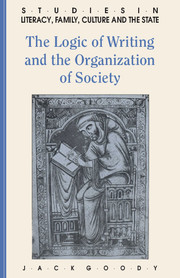1 - The word of God
Published online by Cambridge University Press: 05 June 2012
Summary
In the beginning, we are taught, was the word. And it was, of course, the word of God, God who created the world, or the word of his prophets, then of his son who saved the world. That word was not only spoken but was written down in a book, the Holy Book, the Bible, the Testament. What difference does it make when the word, as in Judaism, Islam and Christianity, is written in a book (or an array of books) rather than being just the word of mouth, the product of the spoken tongue? Are there any general ways in which oral and literate cultures tend to differ in their religious beliefs and practices? How do systems of worship depend upon specific modes of communication? And, over time, how far do traditions of intellectual activity depend upon the earlier presence of a religion of the Book?
These are questions of a highly general kind but they are ones that are touched upon by many scholars, thought about by some, pushed aside by others and about which various assumptions are tacitly made. I want to try and give voice to these largely silent thoughts, taking as my starting point a broad contrast between certain features of African and Eurasian religions, including in the latter not only the religions of the Middle East focussing on a single book but also those that significantly depend upon writing, especially alphabetic writing, for the transmission of myth, doctrine and ritual.
- Type
- Chapter
- Information
- The Logic of Writing and the Organization of Society , pp. 1 - 44Publisher: Cambridge University PressPrint publication year: 1986

